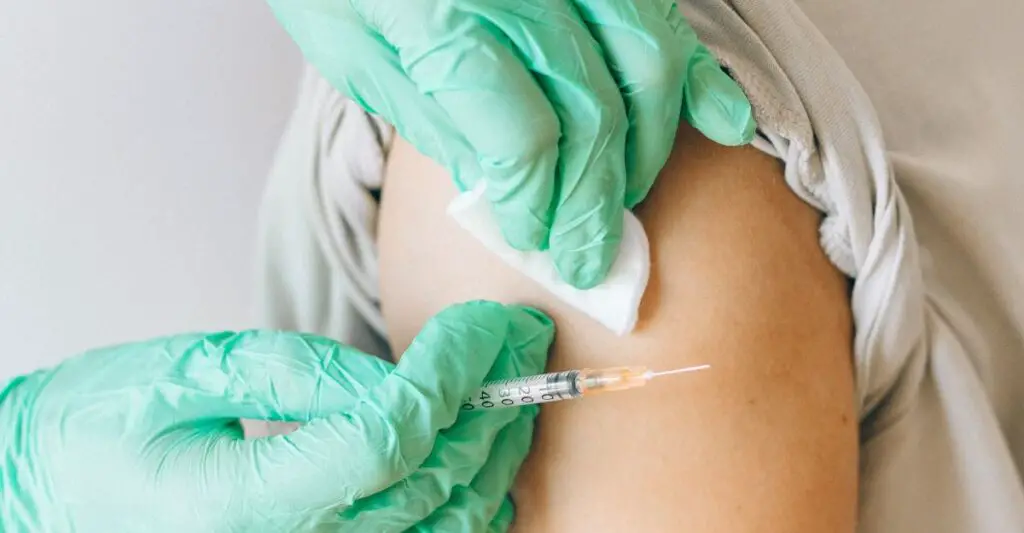Vaccines and Autism: Moving Past the Tired Conspiracy Theory
A concerning and disproven conspiracy theory from over 25 years ago has once again gained some traction, claiming a link between vaccines and autism.
Despite overwhelming scientific evidence proving this anti-vaxxer theory of what causes autism false, its persistence has had harmful consequences for both individuals with autism and society at large.
It is crucial to address this issue, dispel the myths hopefully once and for all, and highlight the potential dangers of this unfounded belief about what causes autism.
The Origins of the Anti-Vaxxer Conspiracy Theory Between Vaccines and Autism

Subsequent rigorous scientific research, involving numerous studies and meta-analyses, has consistently discredited this claim of what causes autism.
However, the effects of this myth and theory of autism continue to linger, perpetuated by misinformation and fear. While I am not a medical expert, I am a believer in the science. And the science, research, studies, and test cases have clearly shown that there is not a connection between vaccines and autism.
Further, these same studies have shown why vaccines are safe.
And as an autistic myself, I am somewhat offended over pathologizing autism and claims I need to be “fixed” or that there is someone to “blame” for me being the way I am.
Harmful Consequences About What Causes Autism for Those on Spectrum
Promoting the idea of the theory of autism that vaccines cause autism not only misleads parents and the general public but also has harmful effects on individuals with autism.
The stigmas associated with autism are already a significant challenge for individuals and their families. Linking it to vaccines exacerbates the stereotypes, further isolating those with autism and hindering their opportunities for growth and development.
The misconception that vaccines are responsible for autism undermines the progress made in understanding the condition and providing the necessary support and resources. Perhaps most importantly, it takes away from the notion of finding autism acceptance in society.
In addition, the anti-vaxxer focus on autism and vaccines diverts attention and resources away from addressing the real needs of individuals with autism. It is essential to prioritize early intervention programs, education, therapeutic support, and fostering acceptance and inclusion in society.
By doing so, we can empower individuals with autism to lead fulfilling lives and contribute their unique talents to the world.
Debunked Anti-Vaxxer Theory Between Autism and Vaccines
The influence of the vaccines and autism conspiracy theory extends beyond the autism community. It poses a significant threat to public health and erodes trust in the safety and efficacy of vaccines.
Vaccines have played a crucial role in preventing the spread of infectious diseases and saving countless lives. By spreading misinformation about vaccines and autism and causes of autism spectrum disorders, this false belief undermines the public’s trust in one of the greatest achievements of modern medicine.
By discouraging vaccination, the vaccine and autism conspiracy theory contributes to the resurgence of preventable diseases. Outbreaks of measles, mumps, and other vaccine-preventable illnesses have occurred in communities with low vaccination rates. That’s because people didn’t understand why vaccines are safe.
These outbreaks put vulnerable populations, including infants, the elderly, and those with weakened immune systems, at greater risk. The consequences can be severe, leading to hospitalizations, long-term health complications, and, tragically, even death.
Furthermore, the impact of reduced vaccination rates extends beyond individual health. The costs associated with treating vaccine-preventable diseases, managing outbreaks, and containing their spread place an enormous burden on healthcare systems and resources.
This strain can impede the provision of care for other illnesses, creating a domino effect that negatively affects overall public health.
Debunking the Falsehood About Causes of Autism Spectrum Disorders

Organizations such as the World Health Organization (WHO), the Centers for Disease Control and Prevention (CDC), the American Academy of Pediatrics, and countless other reputable scientific institutions have unequivocally stated that vaccines are safe and do not cause autism.
They’ve also discussed the theory of autism and causes of autism spectrum disorders at length. Do your own research and see for yourself what they say about what causes autism.
One of the landmark studies examining the potential association between vaccines and autism was conducted in 2002 by the Danish Epidemiology Science Centre. It involved more than 500,000 children and found no increased risk of autism associated with the MMR vaccine.
Subsequent studies in various countries, including Japan, Sweden, and the United States, have consistently replicated these findings.
The largest and most comprehensive study to date about causes of autism spectrum disorders, published in 2019 in the Annals of Internal Medicine, analyzed data from over 600,000 children and concluded that there is no link between the MMR vaccine and autism.
Also, a study conducted by the Centers for Disease Control and Prevention (CDC), which examined the medical records of over 95,000 children, found no association between vaccines and autism.
Protecting Individuals and Society Concerning Causes of Autism Spectrum Disorders
Addressing the harmful effects of the vaccine and autism anti-vaxxer conspiracy theory requires a multifaceted approach.
- Promote accurate information and scientific literacy.
Facts are essential to counteract the spread of misinformation. Health authorities and professionals should engage in open dialogue, providing accessible and evidence-based information about vaccines and autism.Clear communication, transparency, and addressing concerns empathetically can help dispel fears and build trust.
- Focus on supporting individuals with autism is vital.
Enhancing awareness, acceptance, and inclusion can counteract the stigma and discrimination associated with autism.Educating the public about autism, its characteristics, and the challenges individuals face can foster empathy and understanding. By creating an inclusive society, we can help individuals with autism thrive and contribute their unique talents and perspectives.
- Maintain and strengthen vaccination programs.
By ensuring high vaccination rates, we can protect not only vulnerable individuals but also the broader community through herd immunity.Comprehensive vaccination campaigns, public health education, and legislation can help counter the negative impact of the conspiracy theory on public health.
The Importance of Vaccination Education
Prioritizing public education about vacations is key to effectively combating the vaccine-autism conspiracy theory.
Accessible and accurate information should be readily available to counteract the spread of misinformation.
Health authorities and professionals must actively engage with communities, addressing concerns, dispelling myths, and providing evidence-based information about vaccine safety and efficacy.
Public health campaigns that emphasize the benefits of vaccinations, highlight the extensive research conducted, and showcase the overwhelming scientific consensus can help restore public trust.

It’s also crucial to involve influential figures, including healthcare professionals, public figures, and even celebrities, in promoting fact-based vaccination.
This also helps offset the perhaps well-meaning, but utterly misguided celebrities like actress Jenny McCarthy, who once talked incessantly how she “fixed” her son’s autism and blamed his condition on the MMR vaccine.
Endorsements can significantly impact public perception and encourage vaccine uptake. By harnessing their influence responsibly, we can combat vaccine hesitancy and misinformation effectively.
Inclusive Support for Individuals with Autism
Addressing the harmful consequences of the vaccine and autism conspiracy theory necessitates creating a supportive environment for individuals with autism. Society must work towards enhancing awareness, acceptance, and inclusion, ensuring that individuals with autism have equal opportunities to thrive.
Education plays a pivotal role in fostering understanding and acceptance of autism. Introducing comprehensive autism education in schools can help debunk misconceptions and promote a culture of inclusivity.
This education should focus on the diverse range of strengths and challenges individuals with autism possess, breaking down stigmas and stereotypes of autistics and fostering empathy.
Government Action and Legislation
Governments play a crucial role in protecting both individuals with autism and the broader society from the harmful effects of the vaccine-autism conspiracy theory. By implementing legislation and policies that support vaccination and combat misinformation, governments can safeguard public health.
Legal measures can be put in place to ensure accurate information is provided to the public, and penalties can be imposed for the dissemination of false or misleading claims about vaccines.
Efforts to regulate online platforms and social media networks can help curb the spread of misinformation and promote responsible sharing of accurate information.
Government funding and support for research into autism and its causes can contribute to a better understanding of the condition and further debunk the vaccines and autism link.
By investing in research, governments demonstrate their commitment to evidence-based policies and practices.
The vaccine and autism conspiracy theory remains a persistent and dangerous myth that has detrimental effects on individuals with autism and society at large.
By actively combating misinformation, promoting scientific literacy, and fostering inclusivity, we can protect individuals with autism from stigmatization and discrimination while safeguarding public health.
Through comprehensive vaccination campaigns, public education initiatives, and legislation, we can rebuild public trust in vaccines and prevent the resurgence of preventable diseases.
It is our collective responsibility to challenge false beliefs, support individuals with autism, and create an inclusive society that embraces the diverse strengths and contributions of all its members.
My Take on the Autism Conspiracy Theory
I personally was never directly impacted by this inaccurate conspiracy theory of vaccines and autism, as I have only heard of it on the news and the internet.
I guess I should be grateful for never having had to be confronted by those who believe my childhood vaccines caused “my problem” of having autism. But I want to do my part to help the people who have to suffer because of this inaccurate belief, and that’s why I’m writing this blog.
Since this tired myth continues to be perpetuated, I hope I reach more people and perhaps even change their minds. Maybe some of my readers can convince an anti-vaxxer to trust the science and let go of his misguided mission to “save kids” from autism-causing vaccines.
By prioritizing accurate information, empathy, and evidence-based approaches, we can counter the harmful consequences of the vaccine-autism conspiracy theory.
Let’s work together to create a future where individuals with autism are respected, supported, and provided with equal opportunities to thrive, while upholding the principles of public health and the benefits of vaccination.
The CDC has said themselves that vaccines do not cause autism and I have included a link to their article if you want to read more about it.
The notion that vaccines cause autism is a dangerous conspiracy theory that has far-reaching consequences for individuals with autism and society at large.
We must collectively combat misinformation, promote scientific literacy, and foster inclusivity to protect individuals and uphold public health.
I’m at the front of the line hoping we can together build a world where individuals with autism are supported, and public health is safeguarded for the benefit of everyone.
Additional Misconceptions That Lead To Autism Stigmas and Stereotypes
Learn more about other stigmas and stereotypes that autistics face:
· Why Labeling People Can Lead to Stereotyping and Discrimination
· Autism Media Stereotypes: We’re Not All Geniuses, Savants, or Lonely
· Beyond Stereotypes: How Rain Man Revolutionized the Perception of Autism
· Absurd Plot About Autism and Evolution and Why It’s Harmful
· Discover the Powerful Bond Between Autism and Pets
· 3 Reasons Why Pathologizing Crushes Autism Acceptance and Inclusion
· The Hidden Hurdles: Challenging Autism Stigmas in Today’s Politics
· History of Autism: Revealing Shocking Mysteries from the Past
· Knocking Down the Stigma to Autism Obsession